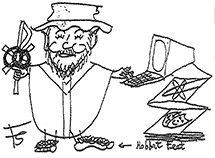Alexander Graham Bell and his wife Mabel lost a baby boy at a time of great stress for the family. Alec Bell (as he was known) was deeply grieved, but accepted much self-blame for having been away at the time. Bell scarcely believed in God; perhaps Einstein’s God, for Bell believed that the more we were to learn through science, the closer we would be to being like God. In other words God was primarily important as a source of knowledge
Poor Mabel, having been brought up in a strict puritan Christianity, believed that God was punishing her: “when Elsie was being naughty, Mabel withheld candy from her and explained that she was punishing Elsie as God had punished her…He had promised me a baby if I would be careful, but I had not been, and he took the little one from me.” (Charlotte Gray, “RELUCTANT GENIUS, The Passionate Life and Inventive Mind of Alexander Graham Bell” Harper [Collins, 2006, page 225.)
No wonder generations of people grew up equating belief in God with a belief in punishment! Atheists can claim that religion is responsible for a guilt-ridden culture, which in turn has endorsed a culture of vengeance and violence. Scientists such as Alec Bell were already inclined to hold such a view of religion, and looked at the progress which science seemed to promise with what might be called “evangelical fervour.”
How, then, can I as a Christian respond to what I regard as a perversion of Christianity?
First, I must admit that there is much in the Bible which shows God as a punisher of evil and a rewarder of goodness. Much in the story of the Hebrew people as a nation shows them straying from the worship of Yahweh, their God, and falling into defeat and civil war, even conquest from beyond their borders. God’s prophets call them back to the covenant or contract with Him. Then we see the prophets increasingly showing a God who is not interested in the outward show of animal sacrifice, feasts and fasts, but instead looks for a change of heart. The people are called to love God, as God is shown loving them, as a spouse or beloved.
Jesus preaches a God of love and forgiveness: he equates healing the body with forgiving of sin, and shows by example a caring for the poor and the outcast. He rejects the guilt-ridden approach to expiation of sin through fulfilling legalism; he introduces his followers to a spiritual kingdom within themselves, which is to liberate them finally from guilt.
In doing so, Jesus is in line with the Hebrew priestly religion of the first Temple, in which God is dramatized as coming forth with the very holiness of the Ark of the Covenant, and freely giving blessing to the world, after the sins have been carried away by sacrificial goats.
And when Jesus, regarded by the Roman and priestly establishment as a blasphemer and political nuisance, is crucified and killed, his followers experience Jesus returning to them, risen from the dead - so powerful a reality that they are prepared to accept his spirit within them, and break with tradition to spread the good news of liberation, of a new covenant, with a God who forgives all guilt, and who finds humanity itself an object of favour (“grace”). God forgives and loves us whether we are good or bad.
So, to explain their experience of Jesus’ death and return in terms they already were familiar with, they saw his as the final sacrifice, which takes away all guilt, brings liberation and hope to the suffering. The idea of death and return is found in most other religions in some form, and the new Church comes to see Jesus as the embodiment of a God who loves people of all faiths, or none.
A friend asked me to explain why if Jesus has died to take away all sin, why do we still have sin? This misunderstanding of the passion and Cross of Jesus is based on the idea of a contract; some traditions have even called it a contract between God and Satan, which could only be redeemed by God’s offering his son. “Redeemed” in this theory is pawn-shop redemption.
A true estimate of the God of Love who is not mainly a God of power, is that God has poured his love into the creation of a cosmos the objective of which was to work towards conscious and sentient beings, whose likeness to God is based on love rather than power; what we call the Incarnation, God becoming human, and the Atonement (God showing his self-offering as a token of his love), are part of a reality we call eternal life, which is almost beyond human imagination, picturing the cosmos groaning and travailing like a woman in childbirth, towards a consummation of the union between the Creator and the Creation:
“For He has made known to us in all wisdom and insight the mystery of his will, according to his purpose which he set forth in Christ, as a plan for the fullness of time, to unite all things in him, things in heaven and things on earth.” (Epistle to the Ephesians, I: 9-10)
Living a life patterned on Jesus does require self-discipline and self-offering, but it is founded on complete forgiveness of neighbour - and self.

